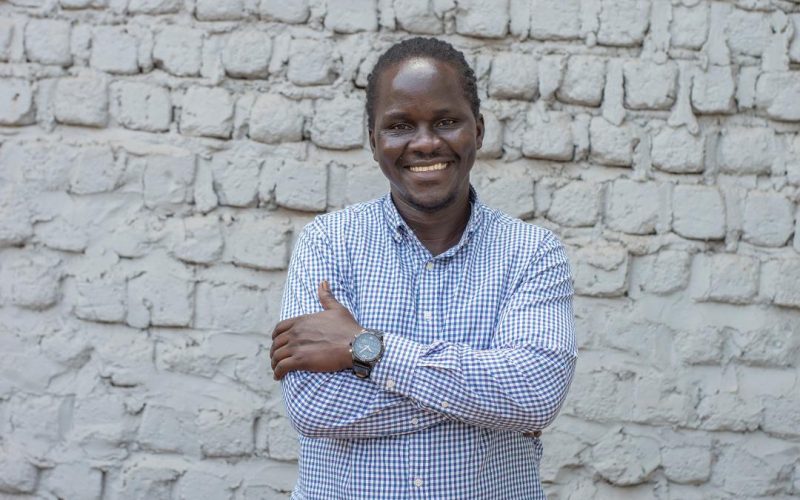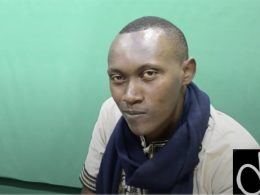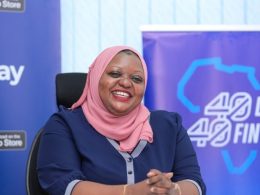The boda boda is a Ugandan institution. The informal, unregulated and ubiquitous motorcycle taxis have long served as Uganda’s primary if unofficial public transport service, helping Ugandans – and the more adventurous tourists – cut through Kampala’s notorious traffic. But their low cost and convenience comes with a price: boda bodas are notoriously dangerous. One study found they contributed to more than 40% of all traffic accidents on Uganda’s roads. One suchaccident resulted in the tragic death of a close friend of Ricky Rapa – the school dropout and former boda driver who, prompted by his friend’s death, went on to co-found SafeBoda, today Uganda’s most popular ride-hailing app. Ricky sat down with Innovate Uganda to discuss his story, the origins of SafeBoda, facing off global competitors, and the future of the Ugandan tech scene.

The school dropout
“So, my personal story is intertwined and connected to the SafeBoda story” Ricky tells us over Zoom, his children playing in the background. “But before I get into that, let me tell you where I come from. I made it to Kampala after dropping out of school two years before I could do High School which would then qualify me for university. I lost my mum, who was the biggest funder for my education. At that point, my father told me to return home, get married and help him take care of my siblings. He felt that the best way to support me was to give me a small piece of land on which I could build a hut and then marry a woman who would cook for me and my siblings. But my father and I failed to agree.”
Instead, Ricky sold his few possessions to raise just enough money for a fare to Kampala. In Uganda’s bustling capital, he found work as a security guard with an agency that posted him to one of Makerere University’s hostels. It was there he made a friend who would help him acquire his first motorbike in 2009. By 2010, he was working as a boda driver.
“It was fun. I was making way more money than what I would make as an askari (security guard). Manning a gate, I earned Ugx120,000 which is about $30 to work for seven days. As a boda rider, I earned an average Ugx30,000 per day. I could save in a week what I earned for a whole month as an askari.”
The road safety advocate
In 2012, the enterprising Ricky founded a sightseeing business with a fleet of drivers where tourists could see Kampala’s historical sites from the back of a boda boda. The business quickly became known for providing helmets to its customers – rare in the boda boda industry even today. “This was part of my sales pitch,” laughs Ricky. “I was literally the only boda boda man that would offer a helmet to my drivers. And I would offer it to clients during the tours.”
One day, one of Ricky’s drivers and close friend got involved in an accident. He was riding without his helmet and injured his head. “Doctors said he would be fine,” sighs Ricky. “After two weeks he came out and he started riding again, because you know, you had to hustle. When he started riding, he started getting headaches. So we took him to the hospital and the doctors said he had a blood clot that had moved closer to the brain. The guy needed an operation and I think the bill was around 16 million shillings, which today is around 4000 dollars. We couldn’t raise it. It was impossible for us to raise it and the guy lived for another 4 months. When he died it was an eye opener for me. I started advocating for road safety.”
Forming an idea
Word soon began to get around about the pro-safety boda rider who always carried a spare helmet for his customers. Soon his growing customer base were asking him if he had friends who also carried helmets that he could recommend. From there, the idea for SafeBoda started to form.
“My idea at the time was very simple: to organize the boda riders. I really wanted to just get these people, give them the basic training they needed, provide them with a helmet and a bit of uniform and then use a call center to connect them.”
Fortunately, through his sightseeing business, Ricky had developed a number of international friends and connections. It was one of these who introduced him to his future co-founder, the Belgian Maxime Dieudonné.
“Max, at the time was here scouting for his own idea. He literally wanted to do the same thing as me but of course a different version. His thinking was much more technology focused. So, we met, and we realized that our interests were aligned. We agreed that instead of me doing something else and him doing something else, we would work together, and that’s how we started working on what is now Safeboda.”
A few weeks later, the pair were joined by their third co-founder, Alastair Sussock from the UK. In 2017, Safeboda officially started operations in Kampala.

Taking on the giants
But they were not the only ones. Ride-hailing giants Uber and Bolt had also begun to test out motorcycle-hailing in Uganda. Suddenly the trio found themselves competing against some of the biggest names in the industry. Safeboda emerged the unlikely winner.
“We didn’t take up a fight or a competition with any of those big giants,” insists Ricky. “I think someone just invaded our industry and you know like when you go into the sea and someone lives in there and you don’t live in there, it’s going to be difficult for you to stay in there. And we were here. Our offices were very physical, in Acacia mall in Kololo where someone can walk in, someone can call, someone can email us, someone can tweet with us and we made ourselves very available.”
In fact, it seemed that winning over the Ugandan public would pose a greater challenge than facing off international tech giants. “Everyone would ask: why do I need an app to get a boda when I can just walk out of my office or my house and find a boda boda waiting for me right outside? People really struggled to understand what we were doing and why we were doing what we were doing.”
But owing to his deep and longstanding experience in the boda industry, Ricky knew what that industry needed in a way international competitors never could. He understood the frustration of the locals, being passed over for higher paying tourists; he understood the tourists’ concerns too – for safety and not being ripped off.
“With our app, you didn’t need to worry about negotiating, or your skin color or how you were dressed. We made it all so easy that when competition came we had already built a great, reputation in the industry. We were already at the point where Ugandans were starting to take notice and asking: is this the right thing for the industry? Then when these giants came with all their resources and started subsidizing wages and all that, people woke up and they were like wow, what Safeboda has been doing is actually great. And of course, it threatened our business but what the big giants and other international companies did by coming to the industry was just to validate our idea and make people realize that you know what? This is our own, what they are doing is great, let’s support our local initiative.”

Servicing the industry, not just the customers
Key to Safeboda’s success has been its deep, longstanding and continuing involvement with the country’s boda riders.
“I have been part of this industry for almost a decade now”, says Ricky. “I have been interacting and working with the boda boda riders for a decade. I kept telling my co-founders and other people as well that the boda industry is not just about subsidizing. It’s about relationships, about trust, it’s about knowing what is best for the industry. And no one has spent more time in the industry than us. We are unique in that we are actually providing a service to the industry, not just the customers but to the drivers too. Out entire operations team is actually ex boda drivers. That is something unique to us. Today I think 30% of our employees are actually ex boda drivers. When you hear about me I’m an ex boda driver, when you hear about Moses Musinguzi (the company’s first rider and current Senior Operations Manager), he is an ex boda driver.”
Nevertheless, just like any company disrupting an industry, SafeBoda faced some stiff resistance from the country’s boda drivers. “Yes, there has been resistance and misrepresentation of the work that we do by some members of the boda boda community and I think this is something that everyone should actually expect. What we decided to do was focus on the few groups of people who understood and who believed in our mission and in our transformation agenda and build them into Safeboda brand ambassadors. These ambassadors were able to communicate with the community directly, countering misinformation and sharing our message and vision. For example, we actually conducted our driver recruitment through our driver networks, with members of the community referring and recruiting other members of the community.”

Safety, technology and financial inclusion
In particular, Ricky is proud of Safeboda’s rigorous driver training programme. As well as consenting to the company’s code of conduct, drivers are first trained in basic road safety. “Traditionally how someone becomes a boda rider is you just buy a motorcycle, start riding on the streets, customers will stop you and you become a boda. There is no formal training, there’s no institution that you go to, there’s no certification that you require and stuff like that.”
Then drivers undergo so-called Fast Respondent Training. “Whenever there is a road accident or anything like that, the first person that you will always find there will be a boda man. We realized that these are the people who can go where others can’t, where cars cannot reach and they are literally everywhere. We just felt like we needed to make them more important and basically give them an opportunity to serve the community in case of an accident and save lives – not only a Safeboda customer, not only themselves, but anyone in an accident in the streets.”
A basic introduction to technology comes next. “When we entered the boda boda industry, smartphone penetration was as low as 10%, and now we are able to provide almost 100% of our drivers with a phone or maybe two phones or three phones already because they keep getting spoilt,” laughs Ricky.
Finally, the drivers are trained in financial literacy. “We want to help them become financially independent, and from there to be able to access other financial services based on the data and information we have. We have entered into a number of partnerships with financial institutions so that they may support on this, and also are, along with government, made aware of the work that the people in the boda boda industry do and of the contribution they make.”

Fertile with opportunity
And what of the future of the Ugandan tech scene?
Ricky pauses. “I think if I was a farmer I would call Uganda a bush – a forest that has never been tampered with, land that has never been ploughed. I mean that the land or the eco-system of the scene right now especially in the tech space, is extremely fertile. If you take your idea just across the border to Kenya, you are going to find much tougher competition and I think it’s a completely different world altogether even when Kenyans are Luo like me, and just as dark as me.”
“What you will see in Kenya is that the speed at which they are running is completely different from us. Here, a lot of opportunities remain in almost all sectors. Take transport, I really think that there has not been yet that one solution for the entire sector and I think there is so much to do. Ok, SafeBoda are here, and Uber which is helping with taxi connection. We also have Bolt that has a role, but none of us have really been able to succeed and take a really significant share of the sector. Similarly, in the education sector, there is not much that has been done and the sector remains green and I think there is so much that people can do.”
“I think if there is any place in the world for anyone to build something and have a unique story to tell that can be interesting for East Africa, West Africa – all of Africa – it is Uganda. If there is anywhere someone can build another giant, it is Uganda. The only issue that we have is around how government approaches technology and that is the only gap that we will continue to advocate to close and we will continue to seek to advise government. Things like the Internet tax and OTT tax (a Ugandan tax on phone data which was removed in July 2021) look like in attack on the tech Industry and should be stayed away from.”
“There is real opportunity here but I think the young people in Uganda and other investors in the world don’t have a lot of time. Someone needs to take a decision right now and build something as soon as yesterday. If we look at E-commerce it basically has just 1% of the entire population of Uganda. if you look at us, we are serving less than 1% of the entire population of Uganda. An App like SafeBoda in a country where you have 46 million Ugandans, may be a little but 1 million maybe a lot. People are still transitioning to technology and now when the market is fresh and growing you have opportunity to build a story and to make a story from nowhere and possibly still have the time you need to make mistakes and learn.”
“For young people out there, I think whatever people call problems in this country is not a problem, it’s an opportunity, it’s a challenge that you can turn into an opportunity and create jobs and also possibly make money for yourself and for the country.”








